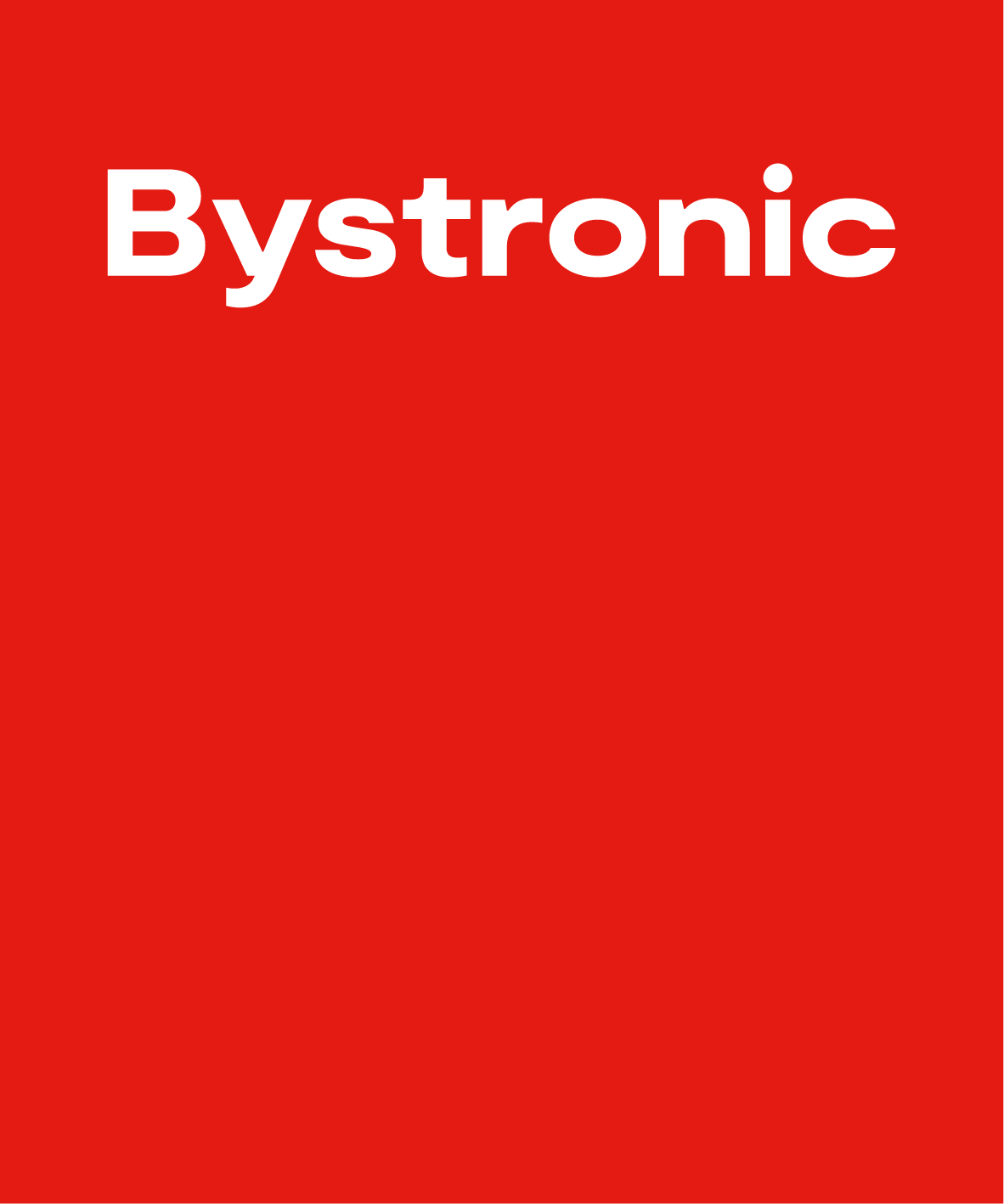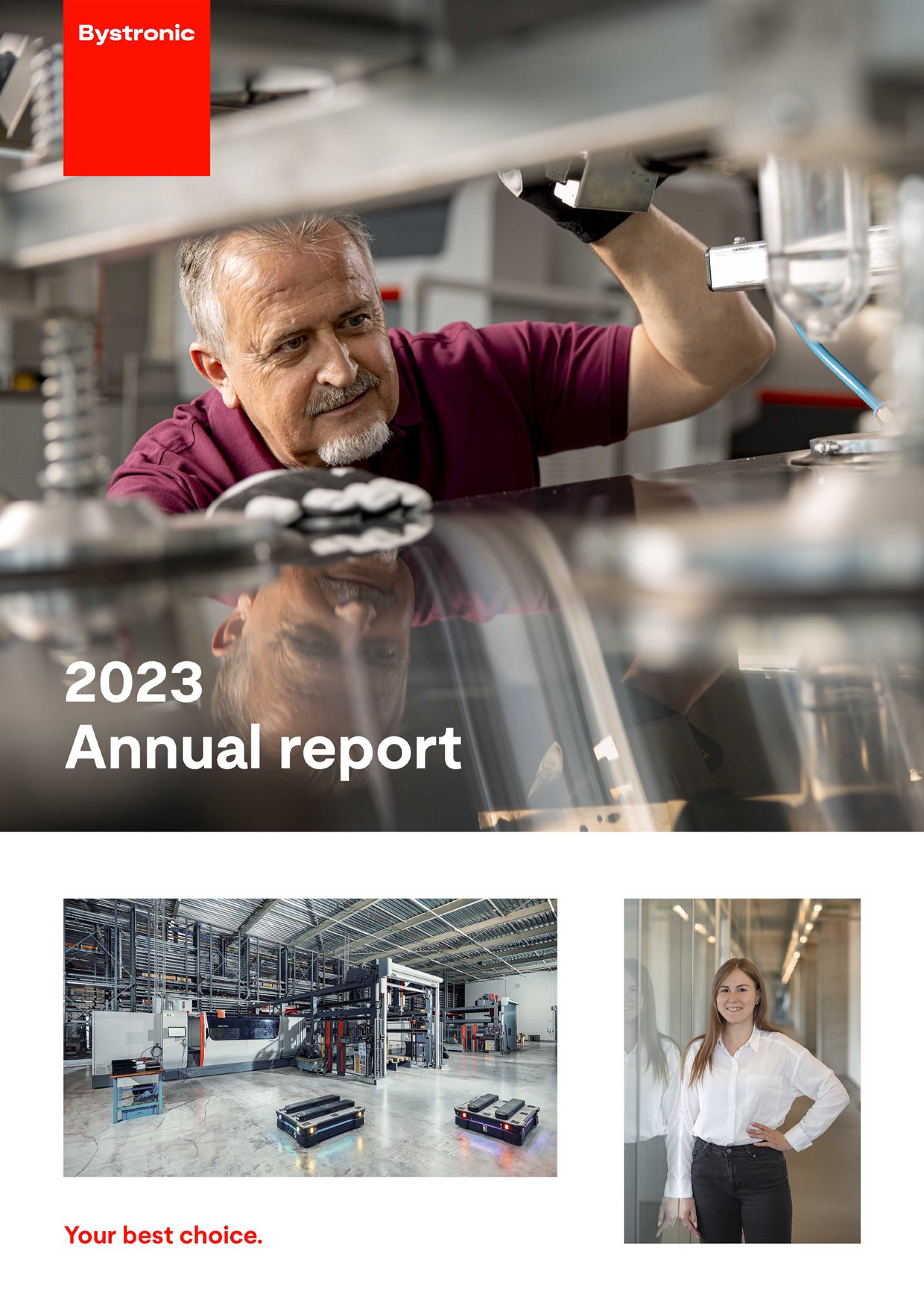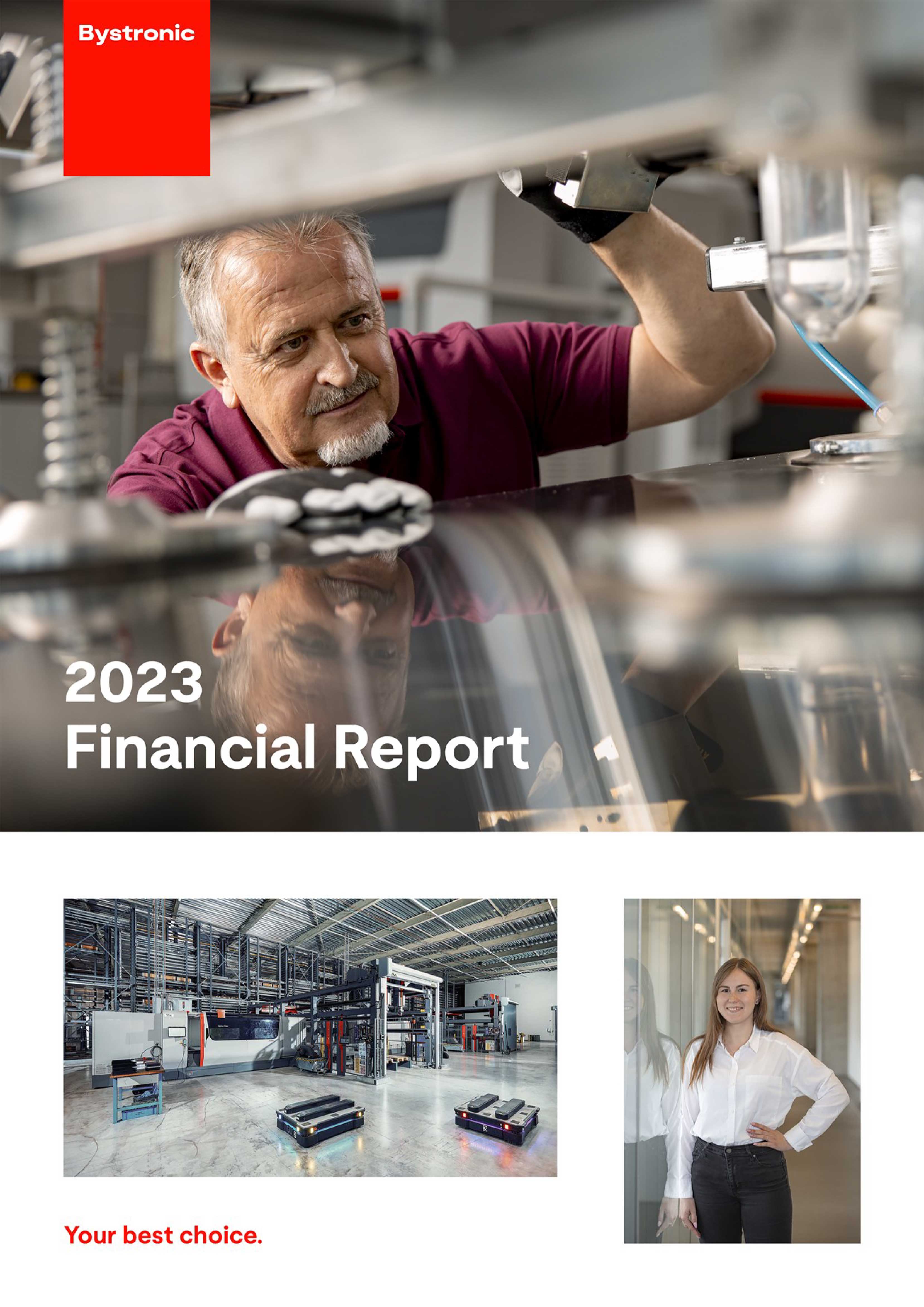Environmental, Social and Governance (ESG)
Sustainability as part of corporate strategy
Introduction
Bystronic takes a holistic approach to sustainability. This is based on our principle of “Creating impact for a sustainable future with sheet metal and beyond." ESG criteria (Environmental, Social, Governance) are an integral part of our business strategy. Our goal is to make sheet metal a material of the future. We are driving sustainable and digital change to make a decisive contribution – for our company, our customers, the environment and our ecosystem.
We strive to lead our industry towards zero emissions. We are working hard to improve energy and resource efficiency. We are proud that our employees propose and implement initiatives that drive our sustainability forward. We also look externally for innovative solutions and work with start-ups to make sheet metal processing more sustainable. We are exploring new possibilities, such as the use of less energy-intensive materials, and we are developing solutions for a longer service life with reduced energy requirements.
The year 2023 was an important milestone on our sustainability journey. By integrating and operationalizing ESG into all areas of our organization, we were able to make tremendous progress. Aligned with the United Nations Sustainable Development Goals (SDGs) and our key themes, we established an ESG strategy with eight pillars and launched more than 20 initiatives.
In our ongoing efforts to make a difference more quickly, we set five ambitious sustainability targets for the year 2030 (baseline 2021):
- 42% reduction in Scope 1 and Scope 2 carbon emissions
- 25% reduction in Scope 3 emissions
- 25% women in management positions
- Industry leader in occupational safety (TRI1 ≤ 0.8)
- 20% reduction of waste
These targets underline our commitment to sustainability, and we are pleased to be on this journey towards a more sustainable future. To ensure that we achieve our goals, we are measuring our progress with our own ESG performance management system.
- The total rate of reportable accidents is the number of accidents per 100 full-time employees.
Highlights
In 2023, we made significant progress in our sustainability efforts. We installed additional solar panels at our headquarters in Niederönz. They will generate 570 MWh of energy annually, which corresponds to 14% of our electricity consumption at that location. As part of our “Strategy to phase out fossil fuels," we also renovated the heating system in Niederönz and installed a heat pump.
The R&D department standardized the calculation of the life cycle assessment of new products and improved the accuracy of energy consumption measurements over the life of our products. Our Global Supply Chain department carried out a risk assessment relating to child labor and conflict minerals and began conducting training courses on human rights. We also introduced a new code of conduct for suppliers.
We were pleased to have exceeded our environmental targets in 2022 compared to 2021. Sustainability data for 2023 has not yet been finalized, but will be published in our 2023 Sustainability Report, which will be released in July 2024:
- Scope 1 & 2 CO2eq emissions: –11%
- Scope 3 CO2eq (products & supply chain): –12%
- 18% of all energy consumed in 2022 came from renewable sources (compared to 4% in 2021)
We are actively promoting diversity, equality and inclusion. The entire management team took part in company-wide training sessions on these topics in the past year.
Report on non-financial matters
Articles 964a –964c of the Swiss Code of Obligations (CO) define reporting obligations with regard to ESG matters. The Code applies for the first time to the 2023 financial year, with the first report to be published in 2024. The report on non-financial matters shall cover environmental matters, in particular CO2 targets, social issues, employee matters, respect for human rights and the fight against corruption.
Articles 964j –964l of the Swiss CO define the companies’ due diligence and reporting obligations regarding conflict minerals and child labor. A detailed, Group-wide analysis of the relevant risks was carried out in collaboration with an external provider. In assessing the due diligence and transparency requirements regarding minerals and metals and child labor (DDoTr), we have concluded that Bystronic is exempt from these obligations.
This section of the Annual Report is intended to provide an overview of the disclosures in connection with Articles 964a –964c and 964j –964l of the Swiss CO. It is supplemented by the principles and commitments in Bystronic’s Code of Conduct and by disclosures in the Bystronic Sustainability Report 2023. The sustainability report is prepared using GRI standards. 2
Bystronic routinely updates its materiality matrix through a dual materiality assessment that evaluates business impacts as well as broader environmental, social and governance (ESG) considerations. The following topics have been identified as material:
- Energy and climate change
- Resource efficiency and the circular economy
- Diversity, inclusion and human rights
- Attracting and developing talent
- Health and safety in the workplace
- Innovation and digitalization
Further information can be found in the materiality section GRI 3–1, “Process for identifying material topics,” and 3–2,“List of material topics” in the sustainability report.
|
|
Overview: Bystronic's core topics and topics covered by the OR |
|||||
|
Environmental issues |
Social issues |
Employee-related issues |
Respect for human rights |
Combating corruption |
||
|
Material topics |
Energy and climate change |
X |
|
|
|
|
|
Resource efficiency and circular economy |
X |
|
|
|
|
|
|
Diversity, inclusion and human rights |
|
X |
X |
X |
|
|
|
Talent management and development |
|
|
X |
|
|
|
|
Health and safety in the workplace |
|
X |
X |
|
|
|
|
Innovation and digitalization |
X |
|
|
|
|
|
|
|
Corporate governance 1 |
|
|
|
|
X |
1 Corporate governance was part of the ESG assessment but was not identified as a material topic.
0. Description of Bystronic’s business model
Bystronic is a leading global supplier of laser cutting, bending and automation systems for the sheet metal industry. The company’s products are used in many sectors, including the automotive, aerospace and electronics industries.
I. Environmental matters
A. Policies and due diligence
Bystronic applies due diligence in environmental matters. Relevant impacts, risks and opportunities are regularly assessed, and policies implemented. The company’s environmental strategy and guidelines define goals and obligations as well as measures and responsibilities in relation to a range of environmental issues. Measures are taken to reduce negative impacts on the environment. Bystronic has key performance indicators (KPIs) for environmental issues that are monitored on a regular basis.
Bystronic wants to minimize its impact on the environment. With its environmental strategy, it wants to reduce energy consumption and the amount of waste generated. The goal is to achieve a net zero across all scopes.
The company's environmental goals include:
- Reduce greenhouse gas emissions in all scopes in line with the net zero roadmap
- Reduce energy consumption and become a climate-neutral company
- Increase the energy efficiency of its products to assist with the decarbonization of customers
- Develop sustainable products and services to reduce/avoid greenhouse gas (GHG) emissions
- Improve resource efficiency and reduce waste by using circular processes
Bystronic is committed to reducing its environmental footprint in line with the “Science Based Targets” initiative. This includes ambitious mid-term environmental targets (base year 2021):
- 42% reduction in Scope 1 and Scope 2 emissions by 2030
- 25% reduction in Scope 3 emissions by 2030
- 20% reduction in waste by 2030
The company's environmental policy is outlined in the “Corporate Responsibility” chapter of the Bystronic Code of Conduct. The results are published annually in the Bystronic Sustainability Report.
B. Measures and effectiveness
Bystronic is implementing a range of measures to reduce its environmental footprint in line with the “Science Based Targets” initiative.
- Installation of solar panels at the key production sites
- Conversion to green electricity in the largest plants, where possible
- Introduction of life cycle analyses (LCAs) and eco-design in the development of product portfolios
Bystronic tracks how effective these initiatives are based on key annual measures. The data comes from Enterprise Resource Planning (ERP) or the ESG contacts in the subsidiaries. The Chief ESG Officer reports directly to the CEO on ESG matters. Further information can be found in the GRI Index under 3–3, “Management of material topics” and in the section on TCFD3 reporting in Bystronic’s sustainability report. The effectiveness of the measures is also reported there.
- TCFD – Task force on climate related financial disclosures: https://www.fsb-tcfd.org/
C. Impacts and main risks
As part of the double materiality assessment, Bystronic evaluates the potential positive and negative impacts its business activities have on the environment. For example, our manufacturing processes consume energy and generate waste. And the Bystronic systems and solutions used by customers also consume energy and resources during sheet metal processing.
The most important risks to the environment are:
- Rising energy costs
- Stricter environmental regulations
- Availability of raw materials and spare parts
Bystronic also sees a number of environmental opportunities, such as:
- The development of new, energy-efficient technologies
- Rising demand for environmentally friendly products
- The growing popularity of circular economy principles
Bystronic has integrated climate-related risks into its risk management. Further information can be found in the section on TCFD reporting in the sustainability report and in the “Risk management” chapter in the annual report.
D. Key performance indicators
Bystronic tracks KPIs that relate to environmental sustainability:
- Energy consumption
- Consumption of renewable energy
- Greenhouse gas emissions: Scope 1, 2, 3, intensity of greenhouse gas emissions
- Waste generation, hazardous waste and disposal methods, waste intensity
- Water consumption
- Number of refurbished machines
Further information can be found in the GRI Index, 305 “Emissions” and GRI 306 “Waste”, as well as in the data and performance table in the sustainability report.
Detailed data on individual performance indicators and the method used to calculate them can be found in the “Data and Performance Report 2022” and in “Data Calculation Methodology 2022”, which are published at the following link: https://sustainability.bystronic.com/en/downloads
The data relates to the 2022 financial year and prior years. Data for the 2023 financial year will be published together with the 2023 Sustainability Report.
II. Social issues
A. Policies and due diligence
Bystronic regularly exchanges ideas and opinions on the topic of sustainability with the following stakeholder groups: customers, suppliers, investors, non-governmental organizations, communities, rating agencies and start-ups. Further information on relationships with stakeholder groups can be found in the GRI Index4 under 2–28, “Membership in associations and interest groups” and 2–29, “Approach to stakeholder engagement” in the sustainability report.
Bystronic applies due diligence in social matters. Relevant impacts, risks and opportunities are regularly assessed, and measures implemented. The company's social strategy and principles lay out its objectives and commitments, as well as measures and responsibilities related to a range of social issues. There are measures aimed at reducing negative social impacts. The company sets KPIs for social issues, which are reviewed regularly.
Bystronic sees itself as a corporate citizen and values its role as a responsible member of society. The company has established several social goals and principles, for example:
- Attracting, developing and retaining the best employees
- Continuing to build and develop a diverse and inclusive workforce
- Continuously improving workplace safety and mental health wellness for all employees
- Supporting human rights and ethical procurement practices
- Providing customers with safe technologies and high-quality products.
Bystronic’s social policy is defined in the guideline, “Conduct towards employees and colleagues” and in the chapters, “We are committed to our customers” and “We conduct our business fairly and do not tolerate bribery” in the Bystronic Code of Conduct. The results are published annually in the sustainability report.
B. Measures and effectiveness
Bystronic implements measures that promote diversity and integration in the workplace:
- Training on unconscious bias for all employees
- Offering flexible work arrangements to promote work-life balance
- Promoting a culture of respect, diversity, and inclusion
Various programs promote a responsible procurement policy and responsible supply chain management:
- Suppliers must comply with the company’s Code of Conduct
- Supplier audits are carried out to ensure compliance with the Code of Conduct
- Collaboration with suppliers to identify and mitigate environmental and social risks in their operations
Other programs promote customer safety, including:
- Customer training on safety measures related to the operation of the machines
- Proactive maintenance and a 360° customer advisory service.
Bystronic reviews the effectiveness of these initiatives on an ongoing basis. Indicators from various sources (employee surveys, information from whistleblowers, supplier audits, customer reports) are compiled for this purpose and clear management responsibilities are defined. The Head of Human Resources reports to the CEO on employee matters. The Head of Global Supply Chain reports to the Chief Operating Officer on supply chain matters. The Head of Global Services reports to the CEO on customer matters. Further information can be found in the GRI Index 3–3, “Management of material topics” in the Bystronic Sustainability Report, where the effectiveness of the measures is also reviewed.
C. Impacts and main risks
As part of the double materiality test, Bystronic assesses the potential positive and negative impacts its business activities have on social issues. For example, there is a risk that our suppliers do not pay their employees a living wage or that they violate human rights. In addition, our systems and solutions could cause injury to customer employees or lead to problems with data protection. The main risks in connection with social issues include:
- Software/IT security/data protection: Risk of cyber-attacks against Bystronic and its customers, protection of customer data and compliance with data protection regulations;
- Employees: Battle for talent, the culture and dynamics after the COVID pandemic.
Further information is in the Corporate Governance Report under section 3.7 “Risk management”.
D. Key performance indicators
Bystronic has several KPIs related to social responsibility, including:
- Employee satisfaction
- Employee engagement
- Key figures on diversity and integration
- Suppliers on the Ecovadis platform 5
- Monitoring of suppliers according to the ESG risk method
- ESG rating of the company
- Customer satisfaction
- Whistleblowing process: tracking ESG complaints in the supply chain.
Further information can be found in the GRI Index under 401 “Employment”, 403 “Occupational health and safety,” 405 “Diversity and equal opportunity”, 416 “Customer health and safety” and in the data and performance table in the sustainability report.
Detailed data on individual performance indicators are published at the following link: https://sustainability.bystronic.com/en/downloads
The data relates to the 2022 financial year and prior years. Data for the 2023 financial year will be published together with the 2023 Sustainability Report.
- EcoVadis is a sustainability rating agency www.ecovadis.com
III. Employee-related issues
A. Policies and due diligence
Bystronic is obligated to deal with employee concerns. Relevant impacts, risks and opportunities are regularly assessed and appropriate measures implemented. The objectives and obligations as well as measures and responsibilities are set out in the Code of Conduct and the HR strategy. Measures are in place to reduce negative impacts on employees. Bystronic regularly measures KPIs on employee-related topics.
Bystronic wants to create a positive and supportive work environment for all employees. To ensure this, we have set ambitious medium-term goals:
- The proportion of women in management positions is to be increased to 25% by 2030
- The Total Recordable Injury Rate should be lower than 0.8 (number of injuries per 100 full-time employees) by 2030
Bystronic’s guidelines regarding employees are defined in the “Conduct towards employees and colleagues” section of the Bystronic Code of Conduct. The results are communicated annually in the sustainability report.
B. Measures and effectiveness
To support employees, Bystronic has numerous Human Resource (HR) guidelines and practices in place, including:
- Competitive remuneration and service packages
- Training and development programs, including on-the-job, classroom and online training
- International experiences for qualified employees
- Leadership courses for young and experienced talents
- A performance management system is designed to help employees realize their full potential
- Open communication and feedback culture: Bystronic encourages its employees to share their ideas and concerns and provide feedback to their supervisors
- Internal communication channels, such as town hall meetings and an employee intranet, allow employees to stay informed about news and developments within the company.
Bystronic is committed to a safe and healthy workplace for all employees. Measures promoting the health and safety of employees include:
- Occupational health and safety management (OHS): A comprehensive program promotes the health and safety of employees with a focus on ergonomics and safety in the workplace
- Safety initiatives: These include the provision of safety equipment and training in how to use the machinery.
Bystronic is committed to ensuring that employees achieve a healthy work-life balance. Various work-life balance initiatives are offered to promote this:
- Flexible work arrangements: Bystronic offers remote work and flexible working hours. This allows employees to better align their professional and private responsibilities.
- Vacation: All Bystronic employees are allowed vacation time based on what is customary in their respective countries.
The effectiveness of these initiatives is monitored using indicators from the employee survey, safety inspections and by defining clear responsibilities: The Head of Human Resources reports to the CEO about employee-related topics. Further information can be found in the GRI Index 3–3, “Management of material topics” in the Bystronic Sustainability Report, which also reviews the effectiveness of the measures.
C. Impacts and main risks
As part of the double materiality test, Bystronic assessed the potential positive and negative effects its business activities have on employee-related matters.
Various scenarios are taken into consideration: For example, Bystronic could be faced with a shortage of skilled workers, or the fluctuation rate could increase due to a lack of promotion opportunities. There is a risk of redundancies in the event of an economic downturn. And, employees could injure themselves on the job or there could be problems with data protection.
Among the main risks associated with employee issues include:
- Software/IT security/data protection: the risk of cyberattacks on Bystronic and its employees, protection of employee data and compliance with data protection regulations
- Employees: The battle for talent, culture and the post-COVID pandemic dynamic.
Further information can be found in the Corporate Governance report under section 3.7 “Risk management”.
D. Key performance indicators
With regard to social responsibility towards employees, Bystronic measures several KPIs, including
- Employee satisfaction
- Employee engagement
- Key figures on diversity and integration
- Indicators of psychological safety
- Health and safety indicators in the workplace.
Further information can be found in the GRI Index 401, “Employment”, 403 “Occupational health and safety”, 405 “Diversity and equal opportunity”, as well as in the data and performance table in the sustainability report.
Detailed information on the specific KPIs is published at the following link: https://sustainability.bystronic.com/en/downloads
The data is from the financial year 2022 as well as prior years. Data for financial year 2023 will be published with our 2023 Sustainability Report.
IV. Safeguarding human rights
A. Policies and due diligence
Bystronic is committed to respecting human rights in all its business activities. Policies and practices ensure that operations are conducted in a manner that respects human rights. These commitments include:
- Human Rights Policy: Bystronic’s commitment to respecting human rights is set out in its Code of Conduct, which states that the company will not tolerate human rights abuses in its operations or supply chain. The policy also outlines the company's commitment to:
- Offer fair working conditions and assurance of fair wages
- Eliminate child or forced labor
- Guarantee freedom of assembly and the right to collective bargaining
- Address grievances
- Protect against discrimination and harassment.
- Due diligence: Bystronic follows a due diligence approach when dealing with human rights issues. Relevant impacts, risks and opportunities are assessed on an ongoing basis and measures implemented. Bystronic is working on a human rights strategy and corresponding guidelines and is making progress in defining goals, measures and responsibilities related to a range of human rights issues. Measures are also being developed to reduce negative impacts on human rights. The company defines measurable KPIs on human rights issues.
- Reporting with regard to the Ordinance on Due Diligence and Transparency with respect to Minerals and Metals from Conflict-Affected Areas and Child Labor (DDoTr): Based on the detailed analysis conducted and the ordinance’s criteria, Bystronic has concluded that the company is exempt from due diligence and reporting obligations with regard to both conflict minerals and child labor.
- Transparency: Bystronic is committed to transparency with regard to human rights.
Bystronic’s human rights policy is set out in the chapter, “We support and respect human rights and freedom of association” in its Code of Conduct. The results are published annually in the sustainability report.
B. Measures and effectiveness
Bystronic has practices aimed at protecting human rights, including:
- Signing of the Code of Conduct: Bystronic requires suppliers to agree to and sign the Code of Conduct.
- Monitoring supplier performance: Bystronic continuously refines supply chain audits with regard to human rights.
- Remediation: Bystronic has a process in place to address human rights violations that occur in its operations or supply chain. The process for remedying violations includes, among other things:
- Investigation of allegations of human rights violations: Bystronic will promptly and thoroughly investigate all allegations of human rights abuses in its operations or supply chain.
- Take corrective action: if an investigation reveals that a human rights violation has occurred, Bystronic will take appropriate corrective action. This may include suspending or terminating supplier relationships or requiring suppliers to take corrective action.
C. Impacts and main risks
Bystronic has begun a risk assessment in human rights: The last audit that looked for child labor or risk materials in the supply chain did not find any issues. As Bystronic sources components from many countries around the world, the company is working to develop a robust risk management system and improve remediation and prevention processes.
D. Key performance indicators
Bystronic has KPIs related to human rights, including:
- Suppliers on the Ecovadis platform 6
- Monitoring of suppliers according to the ESG risk method, including ESG issues
- ESG rating of the company
- Whistleblowing process: tracking human rights complaints in the supply chain
Further information can be found in the data and performance table in our sustainability report.
- EcoVadis is a sustainability rating agency that assesses a company’s impact on sustainability using documented evidence - www.ecovadis.com
V. Combating corruption
A. Policies and due diligence
Bystronic fights corruption in all areas of its business activities. A number of policies and practices are in place to prevent and detect corruption, including:
- Anti-corruption policy: Bystronic’s Code of Conduct includes a comprehensive anti-corruption policy that describes the company's commitment to ethical and transparent business practices. The policy prohibits all forms of bribery and other corrupt practices.
- Due diligence: Bystronic carefully examines suppliers and business partners to ensure that they are not involved in corrupt practices. This includes reviewing supplier documentation, conducting audits and verifying supplier certifications.
The company’s anti-corruption policy is set out in the chapters, “Conduct towards customers, suppliers and business partners” and “Conduct towards competitors,” of the Bystronic Code of Conduct. The results are published annually in the sustainability report.
B. Measures and effectiveness
The company applies various practices to prevent corruption, including:
- Training: Bystronic trains all employees on anti-corruption policies and procedures. The training covers topics such as recognizing and reporting corruption, whistleblowing procedures and the consequences of corruption.
- Monitoring: Bystronic monitors its business activities and relationships with suppliers and business partners for signs of corruption. This includes reviewing transactions, conducting internal investigations, and receiving and investigating whistleblower complaints.
- Review: Bystronic regularly reviews its policies and practices and makes adjustments where necessary.
- Reporting: Bystronic investigates any suspicion of corruption.
C. Impacts and main risks
Corruption can have a negative impact on financial results, reputation, brand image and productivity. It can undermine fair competition, increase legal risks and affect social well-being. This applies to Bystronic and its stakeholders.
The following areas are most exposed to the risk of corruption: Bribery, kickbacks, contracts, gifts and hospitality, political and charitable donations and sponsorships. None of these areas were deemed as a main risk in the annual report.
Bystronic conducts risk analyses to identify and minimize corruption risks in its business activities.
D. Key performance indicators
Bystronic measures KPIs related to corruption. The central KPI related to corruption is the number of whistleblowing reports: Complaints about corruption in the supply chain and with partners are collected and tracked. Further information can be found in the sustainability report.
Zurich, February 29, 2024

Dr. Heinz O. Baumgartner
Chairman of the Board of Directors

Dr. Roland Abt
Chairman of the Audit Committee


